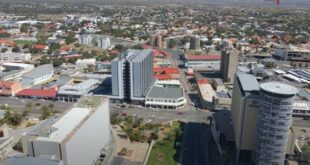As world leaders gather for the 26th UN Climate Change Conference of the Parties (COP26) in Glasgow on 31 October – 12 November 2021, an African expert explains how insurance could achieve four times the impact of post-disaster aid in the continent
——
By Amadou Diallo, Regional Disaster Risk Financing Coordinator, Crisis Anticipation and Risk Financing at Start Network
DAKAR, Senegal, 27 October 2021 -/African Media Agency(AMA)/- According to research and evidence collected by ARC, every one US dollar spent on early intervention through this insurance mechanism saves US$4.5 spent after a crisis unfolds.
It is this logic which lies behind the innovation of insuring against climate disasters such as droughts. In July 2019 Start Network and the government of Senegal each purchased an insurance policy to protect against drought. The ARC is a ground-breaking insurance mechanism designed to help African Union member states resist and recover from the ravages of extreme weather events.
The 2019 policy was premised on the basis that if rainfall levels dropped below a pre-defined threshold, Start Network members and the government of Senegal would receive insurance payouts enabling early intervention to coordinate actions to protect communities at risk. As ARC’s analysis shows, such early intervention costs roughly a quarter of what post-event interventions would cost, but more importantly massively reduces the humanitarian cost.
On the successful expiration of the first insurance policy against drought risk in Senegal, Start Network is announcing its renewal for the 2021 – 2022 season.
Such policies shift the risk from farmers to financiers. Nearly half of all emergency multilateral food assistance to Africa is to assist with climate related disasters. While taking out insurance on the vagaries of weather is today common practice, it is not so on a national level and certainly not drought coverage – due to cultural barriers sometimes but often to financial and economic constraints at household level. What we are doing is an innovation for the African continent as we allow through a macro -insurance mechanism to protect people beyond certain exposure to the drought risk that ultimately leads to aggravated consequences in food insecurity levels and affects the most vulnerable communities.
Underwriting has answers to drought
The ultimate goal has to be for more and more African Union member states to take out their own insurance policies which would transfer the highest possible risk coverage. In parts of Africa, droughts are chronic and their effects on the population are profound. Having Senegal’s government take the initiative in this respect is an extremely positive signal to the rest of the continent.
In the case of a disaster, assistance typically only becomes available three months after the event. By then, you are primarily addressing the impact of the disaster, such as malnutrition, livelihood loss, and other negative consequences. The success of interventions are therefore dependent on the timing of when aid can be delivered. Start Network and ODI research, on UN appeals, suggests that at least 55% of funding went to crises that are somewhat predictable, yet less than 1% of funding for these crises was released based on pre-agreed triggers and plans.
The science of underwriting is able to quantify the likelihood of underperforming rainfall based on years of data and its impact on the incomes of local rural communities. Trigger points are set at which payouts would be made.
The ’trigger’ is based on the Water Requirement Satisfaction Index developed by the UN’s FAO (Food and Agriculture Organisation). This, correlated against satellite rainfall data calculates an estimated number of people likely to be impacted by food insecurity.
ARC Replica Senegal is run in a partnership between the Start Network, the Government of Senegal, and African Risk Capacity (ARC), and is funded by the German Federal Ministry for Economic Cooperation and Development (BMZ) through the German Development Bank, Kreditanstalt für Wiederaufbau (KfW).
NGO lessons learned
Throughout 2020, six Start Network members – Action Against Hunger, Catholic Relief Services, Oxfam, Plan International, Save the Children and World Vision – worked alongside the Government of Senegal to deliver assistance to 355,000 Senegalese ahead of a severe large-scale drought. The agencies’ support came in the form of enriched flour and cash transfers. This enabled families to protect livestock and other valuable assets and avoid resorting to skipping meals or sending children to work instead of going to school.
By acting earlier we can mitigate the impact of crises on communities at risk. For example in Senegal, through a disaster risk finance project which released an insurance pay-out ahead of predicted drought, 98% of children and pregnant and breastfeeding mothers were able to maintain 2 meals a day over the project period -we know that this is more cost-effective then allowing people’s nutritional status to degrade until they require a nutrition intervention.
The programme allowed us to have discussions with all partners at an early stage. It makes a big difference to have pre agreed standard operating procedures in place. It compares favourably to the traditional disaster response, wherein time is typically short as one is constantly ‘fighting fires’ on all fronts.
This is why, this year, Start Network will be launching a scalable infrastructure called the Start Financing Facility to arrange pre-positioned funds using global best practice on risk pooling and layering, to ensure they are used to maximum efficiency. The Start Financing Facility builds upon years of our anticipation experience. It will put local voices at the centre and equip frontline humanitarian responders with the tools needed to be prepared and financially prepared for crises.
© African Media Agency (AMA)
———
Start Network
Start Network is a global network of non-governmental organisations, made up of more than 50 national and international aid agencies from five continents. Its mission is to create a new era of humanitarian action that will save even more lives through innovation, fast funding, early action, and localisation. Start Network believes that pre-emptive climate risk financing could revolutionise the aid sector and catalyse a new way of preparing for crises, helping to create more resilient communities. Visit www.startnetwork.org to see a full list of members.
African Risk Capacity
African Risk Capacity (ARC) Group consists of ARC Agency and ARC Insurance Company Limited (ARC Ltd). ARC Agency was established in 2012 as a Specialized Agency of the African Union to help the Member States improve their capacities to better plan, prepare and respond to weather -related disasters. ARC Ltd is a mutual insurance facility providing risk transfer services to the Member States through risk pooling and access to reinsurance markets.
ARC was established on the principle that investing in preparedness and early warning through an innovative financing approach is highly cost -effective and can save upward of four dollars for every dollar invested ex-ante. With the support of the United Kingdom, Germany, Sweden, Switzerland, Canada, France, the European Union, the Rockefeller Foundation, and the United States, ARC assists the AU Member States in reducing the risk of loss and damage caused by extreme weather events affecting Africa’s populations by providing, through sovereign disaster risk insurance, targeted responses to natural disasters in a more timely, cost-effective, objective and transparent manner.
ARC is now using its expertise to help tackle some of the other most significant threats faced by the continent, including floods and outbreaks & epidemics. Since 2014, 62 policies have been signed by the Member States for cumulative insurance coverage of US$719 million for the protection of 72 million vulnerable populations in participating countries.
For more information, please visit: www.africanriskcapacity.org
 THE AFRICAN COURIER. Reporting Africa and its Diaspora! The African Courier is an international magazine published in Germany to report on Africa and the Diaspora African experience. The first issue of the bimonthly magazine appeared on the newsstands on 15 February 1998. The African Courier is a communication forum for European-African political, economic and cultural exchanges, and a voice for Africa in Europe.
THE AFRICAN COURIER. Reporting Africa and its Diaspora! The African Courier is an international magazine published in Germany to report on Africa and the Diaspora African experience. The first issue of the bimonthly magazine appeared on the newsstands on 15 February 1998. The African Courier is a communication forum for European-African political, economic and cultural exchanges, and a voice for Africa in Europe.
































